
Men at Work is an Australian rock band formed in Melbourne in 1978 and best known for breakthrough hits such as "Down Under", "Who Can It Be Now?", "Be Good Johnny", "Overkill", and "It's a Mistake". Its founding member and frontman is Colin Hay, who performs on lead vocals and guitar. After playing as an acoustic duo with Ron Strykert during 1978–1979, Hay formed the group with Strykert playing bass guitar and Jerry Speiser on drums. They were soon joined by Greg Ham on flute, saxophone, and keyboards and John Rees on bass guitar, with Strykert switching back to lead guitar. The group was managed by Russell Depeller, a friend of Hay, whom he met at La Trobe University. This line-up achieved national and international success during the early to mid-1980s.

Business as Usual is the debut studio album by Australian new wave band Men at Work, which was released in November 1981 in Australia, and April 1982 in the United States. It spent nine weeks at the top of the Australian Kent Music Report Albums Chart from December 1981 through to March 1982. The Australian version had a black and white cover design; overseas releases had a similar design, but in a black and yellow colour scheme. Business as Usual was one of the most successful albums internationally by an Australian group. It spent an unprecedented 15 weeks at No. 1 on the US Billboard 200 from late 1982 to early 1983; and five weeks at No. 1 in the United Kingdom Albums Chart in early 1983. Business as Usual was also one of the highest selling Australian albums in the early 1980s, with 6 million copies shipped in the US, Surprisingly, the disc also made it to No. 31 on Billboard's Black Albums chart.
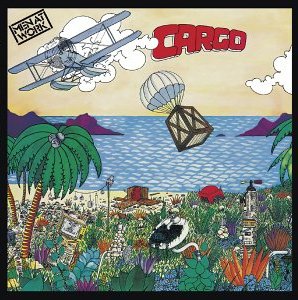
Cargo is the second studio album by the Australian pop rock band Men at Work, which was released in April 1983. It peaked at No. 1 on the Australian Kent Music Report Albums Chart, No. 2 in New Zealand, No. 3 on the United States Billboard 200, and No. 8 on the United Kingdom Albums Chart. Four singles were released from the album, with "Overkill" being an international top 10 hit in Canada, Ireland, Norway, and US Billboard Hot 100. This was the final Men at Work album to feature the original lineup.

Be Yourself Tonight is the fourth studio album by British pop duo Eurythmics, released on 29 April 1985 by RCA Records.

Inside Information is the sixth studio album by the British-American rock band Foreigner, released on December 7, 1987. The album debuted at 15, on the Billboard 200 Albums Chart and was certified Platinum in the U.S. for sales exceeding one million copies. Although a huge standard by any country's charting method, the band's sales were certainly plummeting since the release of 4 in 1981. It was the last album to feature the '80s core lineup of Gramm, Jones, Wills, and Elliott.
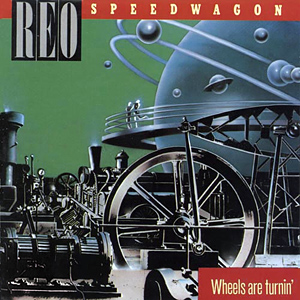
Wheels Are Turnin' is the eleventh studio album by REO Speedwagon, released in November 1984. It reached No. 7 on the Billboard 200. The lead single was "I Do' Wanna Know," which stalled at #29 on the Billboard Hot 100. The second single, "Can't Fight This Feeling," was REO's second and longest-running number one single. Other singles released were "One Lonely Night" and "Live Every Moment". These singles also reached the Top 40 of the Billboard Hot 100, reaching #19 and #34, respectively. The singles from the album also had success on other Billboard charts: "Can't Fight This Feeling" and "I Do' Wanna Know" each reached #5 on the Mainstream Rock chart, with "One Lonely Night" reaching #17, and "Can't Fight This Feeling" and "One Lonely Night" reached #3 and #10, respectively on the Adult Contemporary chart.
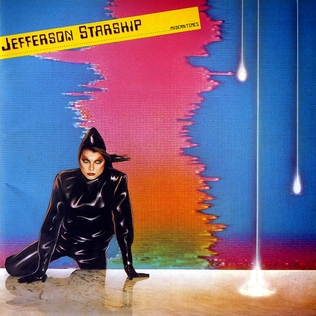
Modern Times is the sixth album by Jefferson Starship and was released in 1981. Grace Slick appeared on this album after a three-year absence. She returned near the end of the recording sessions, providing background vocals on some tracks as well as lead vocals on the single "Stranger" as a duet with lead singer Mickey Thomas. "Stranger" had previously been performed live by Jefferson Starship as early as December 1979, and the first studio version was made for Modern Times. Although not appearing in the band picture on the gatefold cover, Slick is listed on the back cover of the LP with the credit "Introducing Grace Slick" and her picture is on the lyric sleeve with the note "Grace Slick courtesy of Grace Slick." She joined the band officially for the 1981 tour. MTV debuted in 1981 and this was the first Jefferson Starship album to have promotional music videos. It was also the first album to feature a charting single on the Mainstream Rock Tracks chart, which had premiered earlier in the year. The single "Find Your Way Back" reached No. 3 on the Mainstream Rock chart.

Mars Needs Guitars! is Australian rock group Hoodoo Gurus' second album, released in August 1985. The title is a reference to the 1967 science fiction film, Mars Needs Women. Singles from the album were "Bittersweet", "Like Wow – Wipeout", "Death Defying" and "Poison Pen". Mars Needs Guitars! reached No. 140 on the American Billboard 200 albums chart in 1986.
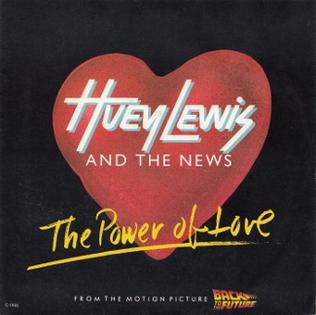
"The Power of Love" is a 1985 single by Huey Lewis and the News, written for the soundtrack of the 1985 blockbuster film Back to the Future. The song became the band's first number-one hit on the U.S. Billboard Hot 100 and their second number-one hit on the U.S. Mainstream Rock chart. In the United Kingdom, it was released as a double-A side with "Do You Believe in Love", becoming the band's only top ten hit on the UK Singles Chart. The song is included alongside "Back in Time" on the film's soundtrack, and appears as a bonus track on international editions of the band's fourth studio album, Fore!.

"Hurts So Good" is a song by American singer-songwriter John Mellencamp, then performing under the stage name "John Cougar". The song was a number two hit on the Billboard Hot 100 for the singer/songwriter. It was the first of three major hit singles from his 1982 album American Fool. The others were "Jack & Diane" and "Hand to Hold On To," which were all released in 1982. The song was also a critical success with Mellencamp, winning the Best Rock Vocal Performance, Male at the 25th Grammy Awards on February 23, 1983.

"Stages" is a song by American rock band ZZ Top. It was released as the second single from their ninth studio album Afterburner (1985). It peaked at number 21 on the United States Billboard Hot 100 and topped the Billboard Hot Mainstream Rock Tracks chart for two weeks.
Little Heroes were an Australian band formed in 1980, by founding mainstay Roger Hart on lead vocals and guitar. They released three studio albums, Little Heroes, Play by Numbers and Watch the World. Their highest charting hit, "One Perfect Day", which was released in 1982, reached No. 12 on the Kent Music Report Singles Chart. Their other charting singles are "Young Hearts" (1982), "Watch the World" and "Bon Voyage". They disbanded in June 1984.

Ego Is Not a Dirty Word is the second studio album released by Australian rock band, Skyhooks, in July 1975. The album was the follow-up to their highly successful debut album, Living in the 70's (1974). As with the former album, it was also produced by Ross Wilson.

Mad Love is the tenth studio album by singer Linda Ronstadt, released in 1980. It debuted at #5 on the Billboard album chart, a record at the time and a first for any female artist, and quickly became her seventh consecutive album to sell over one million copies. It was certified platinum and nominated for a Grammy.

"Your Mama Don't Dance" is a hit 1972 song by the rock duo Loggins and Messina. Released on their self-titled album Loggins and Messina, it reached number four on the Billboard pop chart and number 19 on the Billboard Easy Listening Chart as a single in early 1973.

"Midnight Blue" is a song by American rock singer-songwriter Lou Gramm, issued as a 7" single in the United States in January 1987 by Atlantic Records. It was the lead-off single from Gramm's debut album, Ready or Not, released in February 1987. An extended remix of the song was available as a 12" single.

Air Supply is the debut album by Australian soft rock band Air Supply released on CBS Records in December 1976. The lead single "Love and Other Bruises" was released in October, reaching No. 6 on the Kent Music Report Singles Chart, followed by the album peak at No. 17 on the Kent Albums Chart. While the album reached gold status in Australia, the second single "Empty Pages" did not reach the Top 40 in February 1977. The album was issued as Strangers in Love in Japan.

Lost in Love is the fifth studio album by Australian soft rock band Air Supply, released in March 1980. Their previous four albums never received much attention outside Australia, but Lost in Love was a success on international charts. In the US it peaked at #22 with three singles reaching the top 5. The album was certified 2× Platinum by the RIAA in 1991.
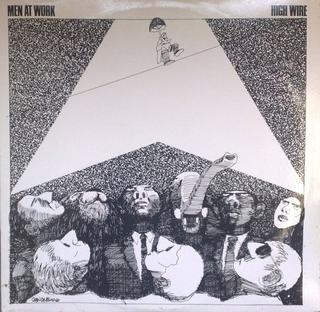
"High Wire" is a song by the Australian group Men at Work. The song was written by Men at Work singer/guitarist Colin Hay and the recording was produced by Peter McIan. It was released in November 1983 as the fourth and final single from their album Cargo.
Dear Enemy was an Australian indie pop band formed in Melbourne in 1980. The band released a studio album, Ransom Note, in 1984 on EMI and Capitol Records that featured its best known single, "Computer One", a No. 15 hit on the Australian Kent Music Report Singles Chart in January 1984. "Computer One" also reached #59 on the Billboard US Mainstream Rock chart in March, 1984. Dear Enemy disbanded in 1988.


















